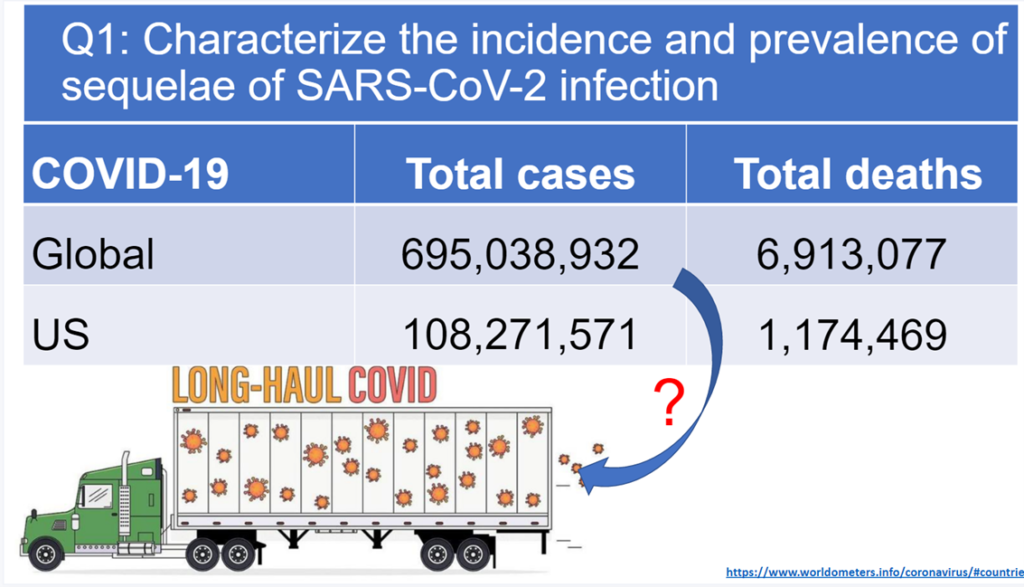The COVID-19 pandemic caused by the SARS-CoV-2 virus has had a significant impact on global health. While much attention has been given to the acute phase of the infection, there is emerging recognition of a subset of individuals experiencing persistent symptoms beyond the acute stage, known as Post-Acute Sequelae of SARS-CoV-2 Infection (PASC). In this article, we explore the medical aspects of PASC, including its clinical manifestations, prevalence, potential underlying mechanisms, and implications for different age groups and sexes.
Clinical Manifestations of PASC:
PASC is characterized by a wide range of symptoms affecting multiple organ systems. These symptoms can persist for weeks or months following the initial SARS-CoV-2 infection. Common symptoms associated with PASC include post-exertional malaise, fatigue, brain fog, dizziness, gastrointestinal symptoms, palpitations, sexual dysfunction, taste/smell disturbances, chronic cough, chest pain, and abnormal movements. However, the severity and frequency of these symptoms can vary among individuals.

Prevalence and Impact of PASC:
The prevalence of PASC is an active area of research. Estimates suggest that approximately 10% of individuals may develop persistent symptoms after SARS-CoV-2 infection. The proportion of individuals experiencing PASC symptoms appears to be higher among those infected prior to the emergence of the Omicron variant. Interestingly, fully vaccinated individuals have shown a lower proportion of PASC symptoms compared to unvaccinated individuals. Additionally, there is evidence suggesting that PASC symptoms may be more common among individuals who have experienced reinfection compared to those with only one reported infection. The impact of PASC on individuals’ quality of life and the burden it places on healthcare systems is substantial and requires further investigation.

Biological Mechanisms and Pathogenesis:
Understanding the underlying biological mechanisms of PASC is crucial for developing effective treatments. Studies have explored various factors contributing to PASC, including immune dysregulation, chronic inflammation, and organ-specific damage. However, the interplay between viral persistence, host immune response, and long-term organ dysfunction in PASC is complex and requires additional research for a comprehensive understanding.
Age and Sex Disparities in PASC:
PASC can affect individuals of all age groups, from pediatrics to older adults. However, there are age-related differences in symptom profiles and disease severity. Furthermore, there are indications of sex differences in PASC, with studies suggesting that females may be more susceptible to certain symptoms or experience a higher disease burden. These disparities require further investigation to develop tailored approaches for the management of PASC.
Long-Term Effects on Organ Systems:
SARS-CoV-2 infection has been associated with long-term effects on various organ systems. Studies have identified cardiac complications, such as incident heart failure, in individuals who have been hospitalized with COVID-19. Additionally, PASC has been linked to respiratory, neurological, gastrointestinal, and other systemic manifestations. Understanding these long-term effects is essential for providing comprehensive care to individuals affected by PASC.
Ongoing Research and Conclusions:
The study of PASC is a rapidly evolving field, with ongoing research aimed at unraveling its pathobiology and identifying effective treatment strategies. Mechanistic studies, including multi-omic platforms, are contributing to our understanding of PASC. Researchers are also working on refining the definition of PASC by including laboratory values to enhance diagnostic accuracy.
Furthermore, efforts are underway to identify distinct subtypes or phenotypes of PASC based on the most impacted organ systems. It is clear that PASC represents a significant medical challenge arising from the COVID-19 pandemic, and continued research is crucial to improve patient outcomes.
Post-Acute Sequelae of SARS-CoV-2 Infection (PASC) is a condition characterized by persistent symptoms beyond the acute phase of COVID-19. The clinical manifestations of PASC span multiple organ systems and can significantly impact individuals’ quality of life. Understanding the prevalence, underlying mechanisms, and long-term effects of PASC is essential for providing appropriate care and developing effective treatment strategies. Ongoing research efforts will continue to advance our knowledge of PASC and help alleviate the burden it imposes on individuals and healthcare systems.


